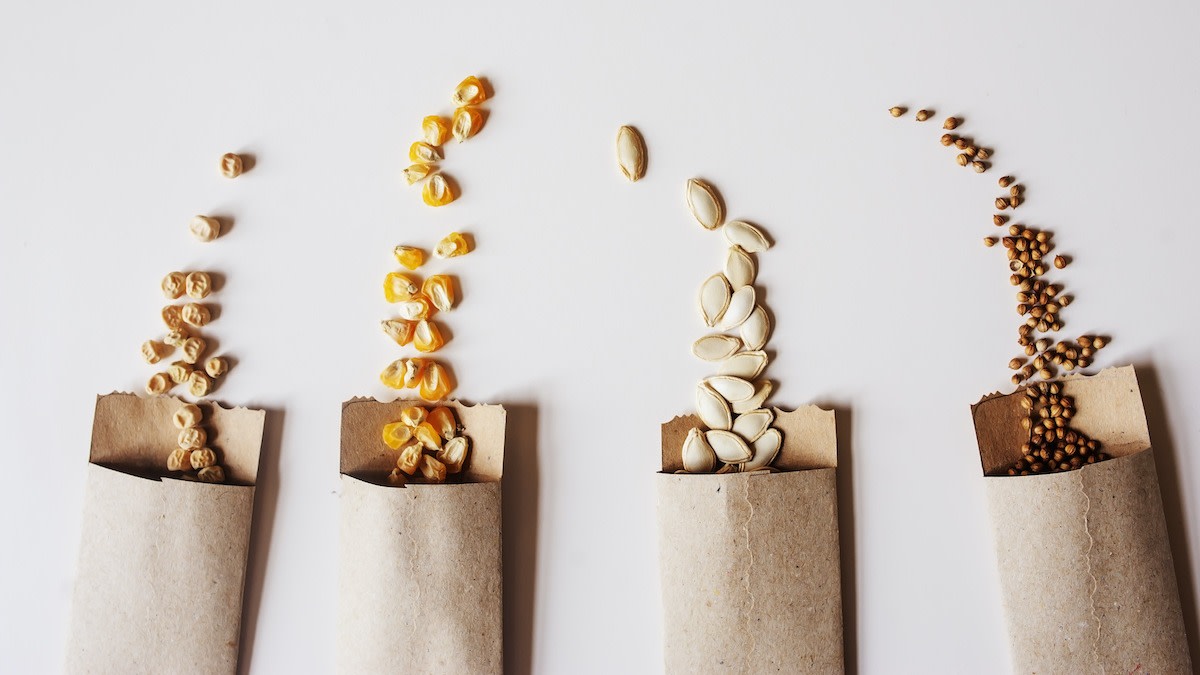Types of Seeds: Heirloom, Hybrid, and Open-Pollinated Seeds
Written by MasterClass
Last updated: Jun 7, 2021 • 3 min read
Choosing the right type of seeds for your garden requires more than simply knowing the type of plant you want to grow. Heirloom seeds, open-pollinated seeds, and hybrid seeds all have pros and cons depending on your specific needs.
Learn From the Best
What Are Open-Pollinated Seeds?
Open-pollinated seeds come from plants that are fertilized by natural methods like pollinator insects, birds, rain, and wind. When two plants of the same variety are cross-pollinated by one of these methods, the resultant seed grows into a plant that is similar to the parent plants, with only slight variations. These variations lead to genetic diversity, which allows the seeds to gradually adapt to the local climate.
When saving seeds from open-pollinated plants, keep your plants isolated from other varieties of the same type of plant. If cross-pollination occurs between your open-pollinated plant and a dissimilar plant variety within the same species, it will produce seeds with different characteristics and may lose its beneficial traits.
What Are Hybrid Seeds?
Plant breeders produce hybrid seeds by cross-pollinating two plant varieties in order to create a hybrid with positive traits from each variety—a process known as hybrid vigor. For example, plant breeders could breed a disease-resistant tomato plant with an especially hardy tomato plant in order to create a new variety of tomato seed that is hardy and disease resistant. Cross-pollination can occur randomly in nature, but the hybrid seed varieties you can purchase are deliberately produced by humans.
First-generation hybrid plant seeds (also known as F1 hybrids) will produce higher yields of plants with the desired mix of traits, but it's a different story if you save seeds from that new batch of plants to grow the following season. These second-generation hybrid varieties (known as F2 hybrids) will only produce a small percentage of plants that are identical to the F1 hybrids, and it's only after about seven generations that the seeds will produce a desirable crop. This is why gardeners who grow hybrids purchase new seeds every year, rather than saving seeds from hybrid plants.
Hybrid Seeds vs. GMO Seeds: What’s the Difference?
Hybrid seeds are the result of cross-pollination between two different plant varieties. Sees that are GMO (genetically modified organisms) are produced in a laboratory via gene splicing and other types of genetic engineering. Most hybrid seeds available for purchase are non-GMO. GMO seeds are typically only used by large-scale commercial growers, so home gardeners likely won't find them when browsing a seed catalog or local garden center.
What Are Heirloom Seeds?
Heirloom seed varieties originate from open-pollinated plants and have a history of passing down desired traits from parent plant to child plant. These valuable characteristics are developed through years of cultivation and may include hardiness, flavor, productivity, pest and disease resistance, and climate adaptability. To be considered an heirloom variety, the seeds typically must originate from plant varieties that are at least 50 years old. While all heirloom seeds come from open-pollinated varieties, not all open-pollinated plants are heirloom plants.
The benefits of heirloom seeds are that they cost less than hybrid seeds, they often result in more flavorful produce than hybrid seeds, they have adapted to your local climate, and they will always produce offspring true to their parent plant so you can save your seeds to grow next year.
Where to Buy Heirloom Seeds
You can purchase heirloom seeds at your local garden center or nursery, or you can find heirloom seeds that are fit for your specific region through local seed exchange groups. Once you acquire heirloom seeds, make sure to practice seed saving so you can continue to plant them each year. Heirloom seeds are often organic seeds, but not always; check the label on the seed packet or look up the seed company to verify that they are USDA certified organic.
Popular types of heirloom vegetable seeds to grow include heirloom tomatoes, radishes, basil, kale, brussels sprouts, turnips, eggplant, and cauliflower. Some popular types of heirloom flower seeds to grow include nasturtiums, marigolds, zinnias, and morning glories.
Learn More
Grow your own food with Ron Finley, the self-described "Gangster Gardener." Get the MasterClass Annual Membership and learn how to cultivate fresh herbs and vegetables, keep your house plants alive, and use compost to make your community - and the world - a better place.
